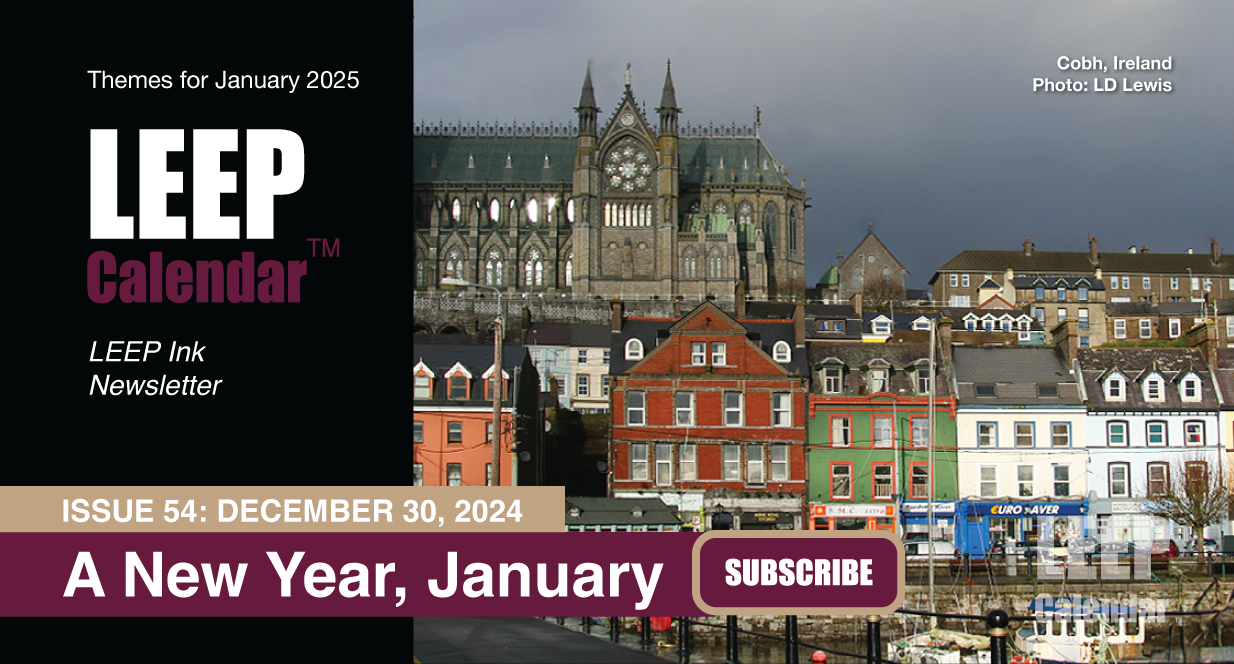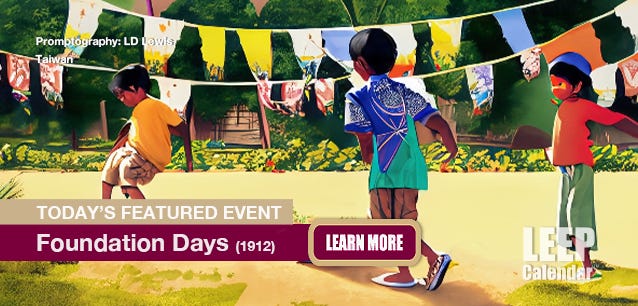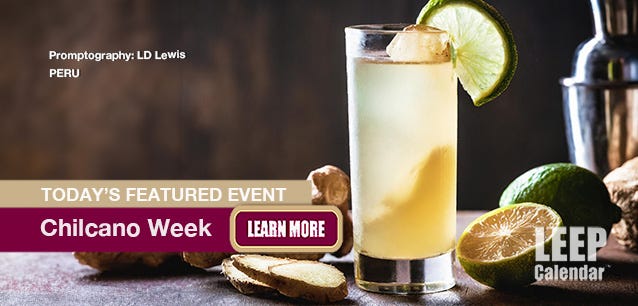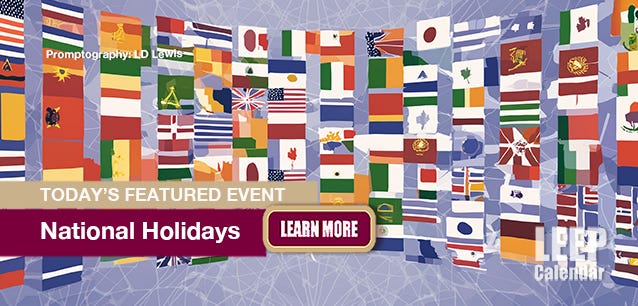 AD
AD

January—It is a New Year!
We've arrived at another new year; the older I get, the more frequently they come. When I was younger, years seemed to take a long time to pass. Now, they're just a blip—here and gone.
For many, 2024 was a horrific year, particularly with events in the Middle East and Sudan and the US and other nations' elections, which tilted toward reminiscences of the 1930s. For others, it was a year of triumph, progress and hope. They see an era of the broom, a destruction of old ways and an ushering in of new policies. Whichever side you sit on, the psychological reset of a new year provides hope and a chance to regroup and resume.
I covered the theme years for 2025 in the past two issues: 2025 is the Year of Part I and Part II. The African Union is focused on justice and reparations. The sun is engaged in major solar storms that will peak in July. Peas will be cuisine's focus, and quantum science and mathematics seek to engage and educate us.
Previous issues in January for 2024 and 2023 have additional events this month.
As always, the descriptions below are abbreviated versions of the full description (generally with videos) on LEEP Calendar. Click through the links or images for more information.
Let's start by honoring the people we all interact with and sometimes fail to appreciate: the world's waitresses, waiters, food servers, bussers, stewards, and other frontline restaurant workers who define our dining experiences.
 |
Servers work in various settings, including serving food and drinks on the beach.
BE KIND TO FOOD SERVERS MONTH
Date: January 1-31, 2025
Location: United States
Champion: Sybil Presley
Be Kind to Food Servers Month honors the tireless food servers who serve restaurant customers and emphasizes the need for better relationships between them. During this time, thank-yous and extra tips for waitstaff are highly appreciated.
Restaurant worker Sybil Presley created the event in the late 2000s as a grassroots initiative to encourage civility and gratitude in public dining settings. The event has gained traction as a meaningful occasion through advocacy by service industry workers, unions, and hospitality organizations.
 |
Family outings and get-togethers are part of Foundation Day festivities—promptography LD Lewis.
FOUNDATION DAYS
Date: January 1-2, [1912]
Location: Taiwan
Champion: Historical Anniversary
Taiwan's history is deeply intertwined with the founding of the Republic of China (ROC) on January 1, 1912, following the Xinhai Revolution that ended imperial rule in China. The ROC’s establishment marked a shift toward democratic governance in Asia, inspired by Western ideals. Initially inhabited by Indigenous peoples, Taiwan was colonized by various powers, including the Dutch, Qing Dynasty, China, and Japan.
After Japan's defeat in World War II, Taiwan was handed to the ROC. Still, the Chinese Civil War resulted in the communist People's Republic of China (PRC) taking control of the mainland in 1949, while the ROC government retreated to Taiwan. This split created an enduring dispute over Taiwan’s sovereignty, with the PRC claiming the island as its territory while Taiwan has developed into a self-governing democracy.
Taiwan operates under a multi-party democracy with an elected president and legislature. It thrives as a global economic and technological hub, particularly semiconductor manufacturing. However, Taiwan’s sovereignty remains contested. The PRC pursues "reunification," while the international community mainly adheres to a "One China" policy while maintaining unofficial ties with Taiwan. Eleven of 193 UN member states officially recognize Taiwan (for context, 46 member states recognize West Sahara; 118 recognize Kosovo; 146 recognize the state of Palestine; 164 recognize the state of Israel).
January 1, 1912, symbolizes the foundation of Taiwan's modern identity and its enduring commitment to self-determination despite its contested status.
 |
Human Trafficking infects healthcare, entertainment, construction and many other industries—photo Ialesh Aldarwish.
NATIONAL HUMAN TRAFFICKING AWARENESS & PREVENTION MONTH
Date: January 1-31, 2025
Location: United States
Champion: ECPAT-USA
National Human Trafficking Awareness & Prevention Month is an initiative of ECPAT-USA, an association of travel and entertainment companies that seeks to protect every child's fundamental human right to grow up free from the threat of sexual exploitation and trafficking.
Human trafficking is a significant and persistent problem in the United States, impacting thousands of individuals annually. It involves exploiting people through force, fraud, or coercion for labor or commercial sex. Victims can be of any age, gender, or nationality, though vulnerable populations, such as undocumented immigrants, runaway youth, and economically disadvantaged individuals, are most at risk.
The United States is both a source and destination for trafficked individuals, with cases reported in urban, suburban, and rural areas. Adult entertainment and services remain the most familiar form of human trafficking. The fastest-growing area of human trafficking is organ removal, where people are lured to locations through coercion, fraud or threat, only to have their organs removed and resold on the black market.
The Department of Homeland Security concurrently champions Slavery and Human Trafficking Prevention Month in January.
 |
Mummers are a tradition in Philadelphia, Pennsylvania, USA. Live in South Philly? At least four schools pass each year through the neighborhoods—photo LD Lewis.
THE MUMMERS PARADE
Date: January 1, 2025
Location: Philadelphia, United States
Champion: Tradition
All day long on January 1, I enjoy a series of parades passing by my home, most stopping at the pub across the street for libations. They wear costumes representing their groups, carry small umbrellas, roll children in strollers and dance through the streets to live rock and roll. Each group has between 200 and 700 revelers. It is quite a sight to see as they wind through the streets of South Philly. It is unique to Philadelphia.
The Mummers Parade is a 120-year-old+ tradition featuring over 10,000 men, women, and children dressed in ostentatious costumes twirling, sashaying, pirouetting, and strutting down the city's main streets. Mummers are men and women of all ages who belong to more than 40 organized clubs that make up the parade participants. The clubs split into five categories — Comics, Wench Brigades, Fancies, String Bands, and the Fancy Brigades — function mainly to stage their lively performances on New Year's Day and at other events throughout the year.
Mummery is a Philadelphia tradition spanning generations and originated in ancient Rome. Then laborers celebrated Saturnalia by marching in masks, exchanging gifts, and making light of the day's issues.
INTERNATIONAL DECADE ON COMBATING SAND AND DUST STORMS
Dates: January 1, 2025 - December 31, 2034
Location: Worldwide
Champion: United Nations
The International Decade on Combating Sand and Dust Stormshighlights the urgency of addressing the widespread impacts of these natural phenomena. This initiative aims to develop strategies for mitigation and adaptation, enhance affected countries' capacities, promote research and monitoring, and foster international cooperation to manage transboundary impacts.
Sand and dust storms pose significant threats, including health risks such as respiratory and cardiovascular diseases, environmental damage such as soil degradation and loss of arable land, economic losses from damaged infrastructure, reduced agricultural productivity, and increased healthcare costs. These storms, which originate primarily in arid regions such as the Sahara, Arabian, Gobi, and Great Victoria Deserts, can travel vast distances, affecting areas far from their origins.
Sand and dust storms devastate agriculture, where they bury crops and reduce soil fertility. They also increase respiratory and cardiovascular diseases in public health, damage infrastructure, and disrupt economic activities like transportation and tourism.
Historical events, such as the 1935 Black Sunday in America during the Dust Bowl and the 2020 Saharan "Godzilla dust cloud," underscore the severe consequences of these storms on human life and the environment. Through global collaboration, the International Decade aims to reduce the frequency and severity of these storms, minimize their impacts, and enhance resilience in affected regions.
 |
CARNIVAL OF BLACK AND WHITE
Date: January 2-7, 2025
Location: Columbia
Champion: Casa Don Lorenzo—Columbian tradition
The Carnival of Black and White (Carnaval de Negros y Blancos) is one of Colombia's most vibrant and culturally significant celebrations, held annually in the southern city of Pasto. Recognized by UNESCO as an Intangible Cultural Heritage of Humanity, the carnival reflects a rich history of cultural fusion and unity among diverse communities.
The carnival is a dazzling showcase of art, music, dance, and tradition. On the festival's second day, revelers paint their bodies with black and white stripes to signify the Spanish crown's abolition of slavery. On the final day, carnival participants throw white powder on each other as a symbol of equality and the integration of all peoples into the culture.
The celebration dates back to pre-Columbian times when indigenous Andean communities honored the moon and sun gods with festivals. During Spanish colonization, these indigenous traditions merged with African and European influences, evolving into a unique cultural event.
 |
The Dakar Rally is one of the toughest races in the world. It is currently held in Saudi Arabia—photo LD Lewis
DAKAR RALLY
Date: January 3-17, 2025
Location: Saudi Arabia
Champion: Amaury Sport Organisation
The Dakar Rally started in Paris over forty years ago and continues annually. For 2020-2025, the host is the Kingdom of Saudi Arabia. Its motto sums up the excitement of this car race: "A challenge for those who go."
The Dakar Rally began when driver Thierry Sabine lost his way during the Abidjan-Nice Rally in 1977. His vision was to create a race that allowed the world to share the scenery of the multi-day event. The race got its name from its first route, beginning in Paris, traveling through Algiers, and finishing in Dakar in Senegal. In 2009, due to security issues, the race moved to South America. Since 2020, it has been on the Arabian Peninsula.
 |
Christmas in Armenia is celebrated at the end of Christmastide, rather than at the beginning—promptography LD Lewis.
CHRISTMAS
Date: January 6, 2025
Location: Armenia
Champion: Christian Religious Holiday
Armenians celebrate Christmas on January 6, aligning with the Feast of the Epiphany to commemorate both the Nativity and the Baptism of Jesus Christ. This tradition reflects the practices of early Christianity before December 25 became the widely recognized date. The Armenian Apostolic Church, one of the oldest Christian traditions and Armenia's primary denomination, has preserved this ancient observance. Armenia, the first nation to adopt Christianity as a state religion in 301 CE, marks the holiday with a blend of solemn religious ceremonies and cherished cultural customs.
The celebration begins on Christmas Eve, January 5, with Jrakaluyts(Lighting of the Lamps), a service featuring hymns, prayers, and scripture readings. On Christmas Day, Armenians attend the Divine Liturgy, which includes the blessing of water to symbolize Christ’s baptism. Festive meals follow, featuring traditional dishes like ghapama(stuffed pumpkin), fish, rice pilaf, and dried fruits.
Armenian Christmas emphasizes spirituality, family, and cultural heritage, reflecting the country’s enduring faith and unique place in the Christian world.
The Orthodox Church celebrates Christmas on January 7.
 |
Chilcano is Peru's national drink—promptography LD Lewis.
CHILCANO WEEK
Date: January 10-17, 2025
Location: Peru
Champion: Manuel Cadenas Mujica
Chilcano Week in Peru is a celebration dedicated to one of the country's most beloved cocktails, the Chilcano. The event gained popularity in the early 2010s. Its inception is a testament to the growing interest in Peruvian cuisine and beverages nationally and internationally.
The Chilcano cocktail, traditionally made with Pisco (a Peruvian grape brandy), lime juice, ginger ale, and a few drops of bitters, is a staple in Peruvian bars and restaurants. Chilcano Week began to celebrate this classic drink and to promote Pisco, an essential component of Peruvian cultural heritage.
Throughout the week, participating bars and restaurants across Peru, especially in cities like Lima and Cusco, offer special menus and promotions featuring various versions of the Chilcano. These establishments often experiment with new flavors and ingredients, showcasing Pisco's versatility and Peruvian mixology's creativity. In addition to enjoying Chilcanos, people participate in a variety of events organized during the week.
 |
Impressionist idea of the world's flags.
NATIONAL HOLIDAYS AROUND THE GLOBE
Independence Day
-
Morocco: January 11, 1944
-
Haiti: January 1, 1804
-
Myanmar: January 4, 1948
-
Sudan: January 1, 1956
King's Birthday,
-
Jordan: January 30, 1962
Liberation Day
-
Cuba: January 1, 1899/1959
-
Poland: January 17, 1945
-
Togo: January 13, 1967
Martyrs Day
-
Azerbaijan: January 20, 1990
-
Panama: January 9, 1964
National Day
-
Nauru: January 31, 1968
National Unity Day
-
Nepal: January 11, 1723
Republic Day
-
India: January 26, 1950
Revolution Day
-
Tanzania: January 12, 1963/1964
 |
Graphic representation of sports.
MAJOR SPORTING EVENTS IN JANUARY 2025
-
AFC Championship Game (American Football): January 26 —United States
-
Asia Cup (Football): January 12 - February 10 —Qatar
-
Australian Open (Tennis): January 13-26 —Australia
-
Cape Town Met (Horse Racing): January 25 —South Africa
-
College National Championship (American Football): January 20 —United States
-
Cotton Bowl, Goodyear (American Football)): January 10 —United States
-
Dakar Rally (Auto Racing): January 3-17 —Saudi Arabia
-
Fort Worth Stock Show and Rodeo (Specialty): January 17 - February 8 —United States
-
NFC Championship Game (American Football): January 26 —United States
-
Orange Bowl (American Football): January 9 —United States
-
Peach Bowl (American Football): January 1 —United States
-
ReliaQuest Bowl (American Football): January 1 —United States
-
Rose Bowl (American Football): January 1 —United States
-
Santos Down Under (Cycling): January 17-26 —Australia
-
Six Nations, Round 1 (Rugby): January 31 - February 1 —Europe
-
Sugar Bowl (American Football): January 1 —United States
-
The American Express (Golf): January 13-19 —United States
-
Winter World University Games (Multi-sport): January 13-23 —Italy
-
Winter X Games (Specialty): January 23-25 —United States
__________________________
And that is a wrap! I ran out of time this month, so there is no deep dive feature.
Thank you for the gift of your time. The next issue will cover events in February in three weeks. See you then, and Happy New Year!
If you're not a subscriber, please subscribe and let me know what you think of LEEPCalendar.com as we launch it! DM me with any thoughts, good or bad. I really want to hear from you. Oh, and please help me spread the word! Thanks all!
This newsletter is available on LinkedIn, Substack and LEEP Calendar.
Last updated: Jan 1st 2025

/footer-logo.svg)
